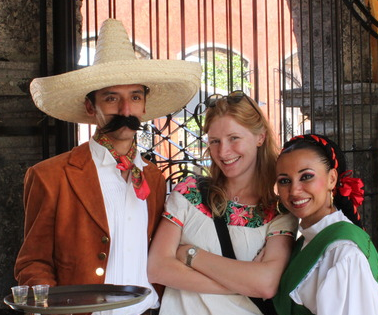Searching for the meaning and origin of the word ‘Gringo:’ The etymological quest
By Sylvan Hardy and Deke Castleman
More than any other destination for North American expats, Cuenca has laid claim to the word “gringo.” There are gringo nights, gringo meet-ups, Gringolandia, gringo invasions and, not to mention Gringo Post and the defunct Gringo Tree.

Gringos abroad have always been good at one thing — talking about themselves.
Of the two dozen or so websites and blogs that include the word “gringo” in their url worldwide, more than half are based in Cuenca. Not only is the word bandied freely about among expats, it is a handy way for Cuencanos to identify not just North Americans, but Europeans, Aussies, and the odd Kiwi as well.
With all the talk about gringos in Cuenca, the question arises: what exactly does the word “gringo” mean? And where does it come from?
“Gringo” is a demonym, which has nothing to do with demons. Rather, it’s Greek for the name (nym) of a populace (demos), a linguistic term that describes “a resident of a locality that is often derived from the name of the locality.”
Some linguists believe the word gringo originated in the Caló language spoken by the Spanish Romani people; the Caló word peregringo means “stranger” or “wayfarer”(and is where we get our term “peregrination”). Most scholars, however, agree that gringo is derived from “griego,” the Spanish word for Greek.
In Spanish, just like English, something that is difficult or impossible to understand is considered Greek. The English idiom is, “It’s Greek to me”; in Spanish, the expression is hablar en griego (to speak in Greek).

Gringos like having their picture taken with locals.
This phrase can be traced back to a Latin proverb from the Middle Ages: Graecum est; non potest legi (“It is Greek; it cannot be read”). William Shakespeare adopted the phrase in his Julius Caesar, written in 1599, when Casca, a co-conspirator against Caesar, wrote, “Those that understood him smiled at one another and shook their heads; but for mine own part, it was Greek to me.”
The first use of the word gringo itself was seen in the Diccionario Castellano, a Spanish dictionary of science and art compiled by Esteban de Terreros and published in 1787. De Terreros noted that in Malaga, “Foreigners who have a certain type of accent which keeps them from speaking Spanish easily and naturally” were referred to as gringos; according to de Terreros, the same word was used in Madrid, particularly to describe the Irish. Esteban Echeverría used it to signify an Englishman in his El Matadero in 1840.
According to the Oxford English Dictionary, the first known use of the term in English appeared in The Western Journal by John Woodhouse Audubon, son of the famous nature artist, published in 1849. Audubon wrote about passing through the town of Cerro Gordo in Veracruz, Mexico, that he and his traveling companions “were hooted and shouted at” and called “Gringos.”
A number of descriptions of the origin of the term crop up around this time, the mid-19th century. One somewhat obscure theory holds that the word is a variation of “green horn,” which referred to an apprentice jeweler in Europe and was adopted by pioneers on the western U.S. frontier to signify pilgrims from the east. Spanish speakers in the western U.S. supposedly altered greenhorn to gringo.
A popular etymology insists that the word is from the old Irish folk song “Green Grow the Rushes, Oh.” This song was sung around the campfire during the Mexican-American War (1846-1848) by a handful of Irish, German, and other recently immigrated Catholic Americans who, wondering why they were fighting against Catholics and resenting their Anglo-Protestant officers, deserted the U.S. Army and joined forces with Mexico.
Another etymology claims that gringo is derived from “Greencoat,” referring to U.S. soldiers and their green uniforms. A similar myth holds that the Mexicans shouted “Green go!” at the Yankees. (However, American soldiers wore blue uniforms during the Mexican-American War; they didn’t wear green until World War I.)
Although the word gringo was known long before the 1840s, these etymologies suggest that the Mexican-American War popularized the word for Spanish and English speakers alike. It might also explain why gringo is a derogatory term for a foreigner or a foreign language in Mexico, while there’s nothing negative or derisive about its use in Ecuador.
After all, though gringos might be “invading” Ecuador, especially Cuenca, the U.S. Army never has!


















